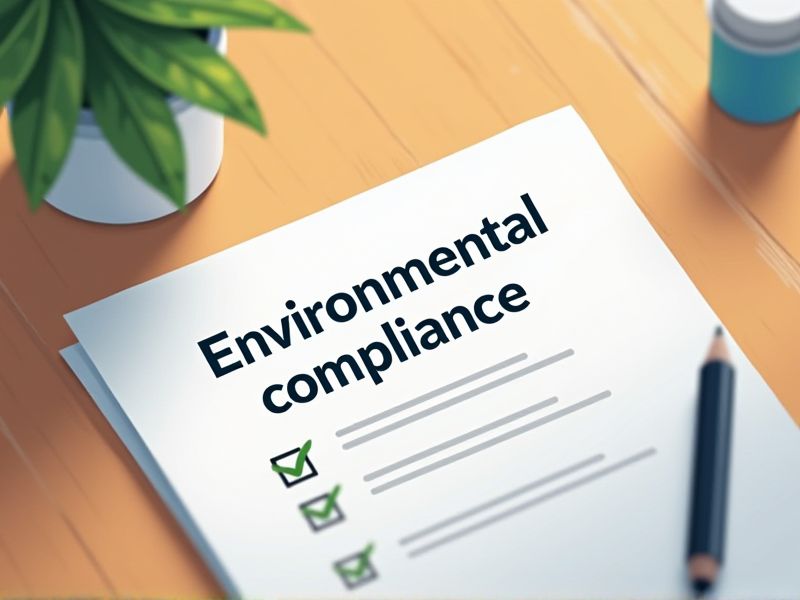
An Environmental compliance auditor ensures companies adhere to environmental laws and regulations, minimizing ecological impact and avoiding legal penalties. Certifications validate an auditor's knowledge of complex environmental regulations and demonstrate competency in assessing compliance efficiently. These certifications also enhance credibility and open opportunities for career advancement in the field. Important certifications for Environmental compliance auditors include those related to environmental management systems, hazardous materials handling, and sustainability practices.
ISO 14001 Lead Auditor Certification
Obtaining ISO 14001 Lead Auditor Certification equips an environmental compliance auditor with the skills to effectively assess and enhance an organization's environmental management system. This certification is widely recognized and can significantly bolster an auditor's professional credibility and trustworthiness. The structured training enhances the auditor's ability to identify non-conformities and suggest improvements in line with international standards. This certification can also create competitive advantages by enabling auditors to work across different industries and countries that adhere to ISO 14001 guidelines.
Certified Environmental Auditor (CEA)
Environmental compliance auditing ensures organizations meet regulatory requirements, and hiring a Certified Environmental Auditor (CEA) enhances credibility due to their specialized knowledge. CEAs possess expertise in identifying potential environmental risks, helping businesses avoid costly penalties. Their certification reflects a commitment to continuous learning, ensuring auditors stay updated on evolving environmental laws. Employing a CEA promotes sustainable practices, which can improve an organization's reputation and stakeholder trust.
Certified Environmental Compliance Professional (CECP)
Organizations require Certified Environmental Compliance Professionals (CECP) because they possess specialized knowledge in adhering to environmental regulations. The CECP credential ensures that compliance auditors are thoroughly trained in the latest environmental laws and standards. This expertise helps in reducing the risk of regulatory fines and legal consequences for businesses. Employing CECP-certified auditors can enhance an organization's reputation by demonstrating a commitment to sustainable practices.
Certified Hazardous Materials Manager (CHMM)
Organizations face regulatory scrutiny regarding hazardous materials, which makes a Certified Hazardous Materials Manager (CHMM) vital for comprehensive compliance oversight. A CHMM provides the expertise necessary to identify, evaluate, and manage risks associated with hazardous substances, ensuring adherence to environmental laws. Their specialized knowledge reduces the likelihood of environmental violations, thereby safeguarding the organization from potential legal and financial repercussions. By integrating a CHMM's insight, companies achieve more effective and strategic environmental audits.
Certified Safety Professional (CSP)
The Certified Safety Professional (CSP) credential emphasizes a thorough understanding of safety regulations, which is crucial for ensuring compliance with environmental laws. Auditors with CSP certification are equipped to identify potential environmental hazards and recommend effective mitigation strategies. Knowledge gained from CSP training enhances the ability to assess and manage risk in environmental compliance audits. Employing CSP-certified auditors increases an organization's credibility and trust in adhering to environmental standards.
Certified Industrial Hygienist (CIH)
Companies must adhere to strict environmental regulations, and a Certified Industrial Hygienist (CIH) ensures these standards are met. The CIH's expertise in identifying and managing workplace environmental hazards directly impacts compliance with legal and safety protocols. Failure to comply with these regulations can lead to significant fines and legal repercussions. By involving a CIH, organizations actively reduce risks related to environmental health and safety, leading to a safer workplace and a sustainable business model.
OSHA 30-Hour General Industry Certification
Obtaining the OSHA 30-Hour General Industry Certification equips an environmental compliance auditor with a thorough understanding of workplace safety standards, which is critical for assessing compliance with regulatory requirements. This certification enhances an auditor's ability to identify potential hazards and risks, contributing to more accurate and comprehensive environmental audits. The training also fosters a culture of safety mindfulness, which can improve the overall safety performance of the organizations being audited. By having this certification, auditors are more credible and can provide more reliable insights into improving safety and compliance practices.
LEED Accredited Professional (LEED AP)
Having a LEED Accredited Professional certification equips an environmental compliance auditor with a comprehensive understanding of sustainable building practices, enhancing their ability to assess compliance with environmental standards. The LEED AP credential ensures that auditors can effectively identify areas of improvement in sustainable practices, leading to better resource efficiency and reduced environmental impact. It also positions auditors to provide more informed guidance on achieving and maintaining LEED certification for projects, promoting sustainable development. The credential underscores their expertise, making them more credible and valuable in their field.
Six Sigma Green Belt Certification
Obtaining a Six Sigma Green Belt Certification equips an environmental compliance auditor with critical skills in process improvement, leading to more effective and efficient audits. This certification introduces data-driven methodologies and statistical analysis, which improve decision-making and problem-solving capabilities in environmental management. It enhances the auditor's ability to identify and eliminate waste and inefficiencies, promoting more sustainable practices. Employing Six Sigma principles helps align environmental policies with regulatory requirements, reducing the risk of non-compliance and potential penalties.
Environmental Management Systems Auditor (EMSA) Certification
Achieving EMSA Certification ensures that an environmental compliance auditor has a comprehensive understanding of current environmental regulations and standards. This level of knowledge is critical for accurately assessing a company's adherence to environmental laws. Certified auditors are more capable of identifying potential risks and recommending effective corrective actions. The certification also bolsters the organization's credibility by demonstrating a commitment to sustainability and regulatory compliance.
Summary
You can significantly enhance your professional credibility by obtaining relevant environmental compliance certifications. Employers are more likely to recognize your expertise, which may lead to increased job opportunities or career advancement. With these certifications, you gain a structured understanding of regulatory standards, which can improve your ability to identify and rectify compliance issues. Organizations value such credentials, potentially resulting in higher demand for your auditing services.
